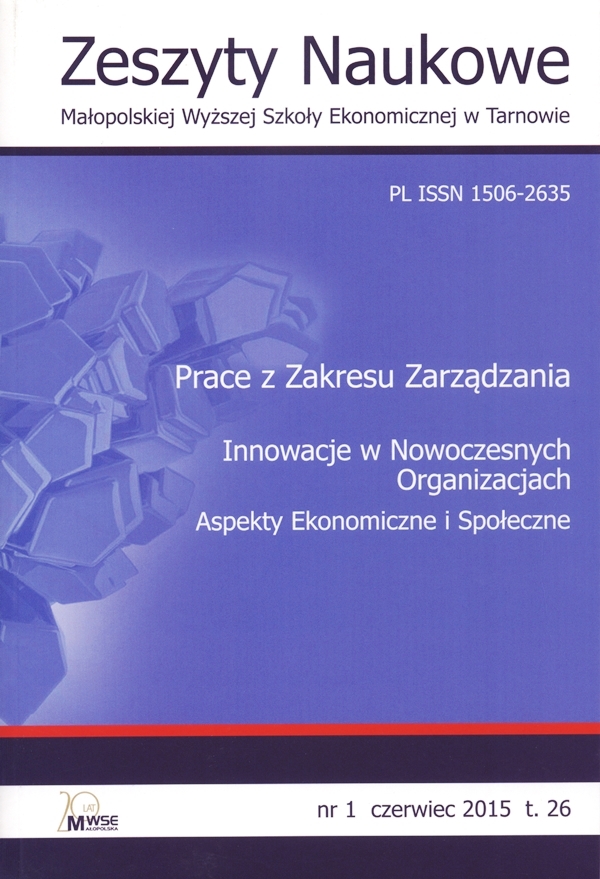Abstrakt
Pomorze to region o dużym potencjale rozwoju, ale ze stosunkowo zaniedbaną infrastrukturą i sporymi mankamentami w zakresie zarządzania. Celem badań było określenie postaw mieszkańców Pomorza Zachodniego (Polska 2014) pojmowanych jako zasoby ludzkie względem globalizacji i jej wpływu na gospodarkę turystyczną wiejską w tym regionie. Badaniami objęto reprezentatywną próbę 247 osób na Pomorzu Zachodnim; przeprowadzono również sporadyczne poszukiwawcze badania jakościowe. Ankieterzy, używając kwestionariuszy, wykonali wywiady. Wyniki badań określiły, że Pomorzanie, uznając ważność globalizacji, byli skupieni głównie na dostępności dla nich podstawowych zasobów i podejmowaniu pracy; nie określali wiedzy/kwalifikacji jako wiodących elementów ich życia. Mając zaspokojone podstawowe potrzeby, nie zawsze uznawali za konieczne powiększanie konkurencyjności mieszkańców, regionu lub przedsiębiorstw. Jako najważniejszy cel wskazano polepszenie pracy administracji państwowej i samorządowej oraz naprawę sądownictwa. Konieczne innowacje odtwórcze i bardziej potrzebne kreacyjne są związane z wykorzystaniem tezaurusa metod zarządzania w regionalnej polityce społeczno-gospodarczej w skali makro- i mikroekonomicznej, a także z efektywnością środków pomocowych UE na lata 2014–2020. Istotna jest ponadto praktyka teorii wartości i kultury akceptacji.
Bibliografia
Feczko, J. (2013). Postawy konsumentów a globalizacja: elementy ekonomiczne, zarządzania marketingowego i turystyczne. Pomorze 2013. Zeszyty Naukowe Szkoły Głównej Gospodarstwa Wiejskiego w Warszawie: Polityki Europejskie, Finanse i Marketing, 9, 140‒160.
Zobacz w Google Scholar
GUS (2013). Europejskie badania dochodów i warunków życia (EU-SILC) w 2012. Warszawa: Główny Urząd Statystyczny. ISBN 978-83-7027-536-8.
Zobacz w Google Scholar
Hausner, J. (2014). Dyskusja w gospodarce. Polityka.pl., 9.01.2014.
Zobacz w Google Scholar
Hollander, H., Es-Sadki, N., (2013). Innovation Union Scoreboard 2013 [online, dostęp: 2014-03-02]. Brussels: European Commission. Dostępny w Internecie: http://ec.europa.eu/enterprise/policies/innovation/files/ius-2013_en.pdf.
Zobacz w Google Scholar
MAiC (2013). Długookresowa strategia rozwoju kraju Polska 2030. Trzecia fala nowoczesności. Warszawa: Ministerstwo Administracji i Cyfryzacji.
Zobacz w Google Scholar
Niewinowska, M. (2013). Na drodze rozwoju [online, dostęp: 2014-06-23]. Polityka, 26 listopada. Dostępny w Internecie: http://www.polityka.pl/tygodnikpolityka/rynek/1562335,1,na-drodze-rozwoju.read.
Zobacz w Google Scholar
Sedláček, T. (2011). Ekonomia dobra i zła. W poszukiwaniu istoty ekonomii od Gilgamesza do Wall Street. Warszawa: Studio Emka. ISBN 978-83-6230-8.
Zobacz w Google Scholar
Świeczewska, I. (2014). Realizacja celów rozwoju krajów Unii Europejskiej opartego na wiedzy i innowacjach. Wiadomości Statystyczne, 1 (styczeń), 51–67. ISSN 0043-518X.
Zobacz w Google Scholar
UMWZ (2005). Strategia Rozwoju Województwa Zachodniopomorskiego do roku 2020. Szczecin: Urząd Marszałkowski Województwa Zachodniopomorskiego; Sejmik Województwa Zachodniopomorskiego.
Zobacz w Google Scholar
UMWZ (2010). Strategia Rozwoju Województwa Zachodniopomorskiego. Szczecin: Urząd Marszałkowski Województwa Zachodniopomorskiego. ISBN 978-83-88664-12-0.
Zobacz w Google Scholar
Zachariasz, K. (2014). Fundusze unijne nie tworzą nowych miejsc pracy. To mit [online, dostęp: 2014-06-23]. Wyborcza.biz. Dostępny w Internecie: http://wyborcza.biz/biznes/1,100896,16190730,Fundusze_unijne_nie_tworza_miejsc_pracy__To_mit.html.
Zobacz w Google Scholar
© Copyright by Małopolska Wyższa Szkoła Ekonomiczna w Tarnowie. Artykuły są udostępniane na podstawie Creative Commons Attribution Uznanie autorstwa - Użycie niekomercyjne - Bez utworów zależnych 4.0 Licencja Międzynarodowa


